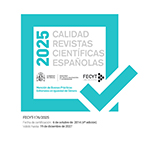Competencias transversales y empleabilidad. Un reto para la pedagogía penitenciaria
Resumen
La formación laboral de los internos e internas en centros penitenciarios debe ocupar un papel central en su proceso de reeducación y reinserción social, a tenor de lo expuesto en la legislación española. Precisamente, esta cuestión se antoja todavía más pertinente en el contexto de globalización en el que se encuentra nuestra sociedad, donde el mercado laboral demanda trabajadores/as capaces de responder a los nuevos requerimientos del entramado empresarial. En este artículo defendemos la necesidad de que los programas de orientación y formación profesional que se llevan a cabo en las prisiones potencien el desarrollo de competencias de carácter transversal, imprescindibles no solo para el acceso a un puesto de trabajo, sino también para su mantenimiento. Con tal propósito, se han analizado, en primer lugar, las características de los/as destinatarios/as de estos programas, profundizando en las variables contextuales, formativo-profesionales y ocupacionales que han demostrado incidir en tal proceso. Posteriormente, se ha examinado la oferta formativa en el ámbito laboral de las prisiones españolas para comprobar si se desarrollan las competencias asociadas a una mayor empleabilidad. Concluimos que existe una falta de promoción de las competencias transversales en la formación laboral de los centros penitenciarios, junto a la necesidad de considerar aquellas variables contextuales y factores estructurales que son susceptibles de condicionar su inclusión sociolaboral.
Descargas
Descarga artículo
Licencia
La Revista Complutense de Educación, para fomentar el intercambio global del conocimiento, facilita el acceso sin restricciones a sus contenidos desde el momento de su publicación en la presente edición electrónica, y por eso es una revista de acceso abierto. Los originales publicados en esta revista son propiedad de la Universidad Complutense de Madrid y es obligatorio citar su procedencia en cualquier reproducción total o parcial. Todos los contenidos se distribuyen bajo una licencia de uso y distribución Creative Commons Reconocimiento 4.0 (CC BY 4.0). Esta circunstancia ha de hacerse constar expresamente de esta forma cuando sea necesario. Puede consultar la versión informativa y el texto legal de la licencia.











